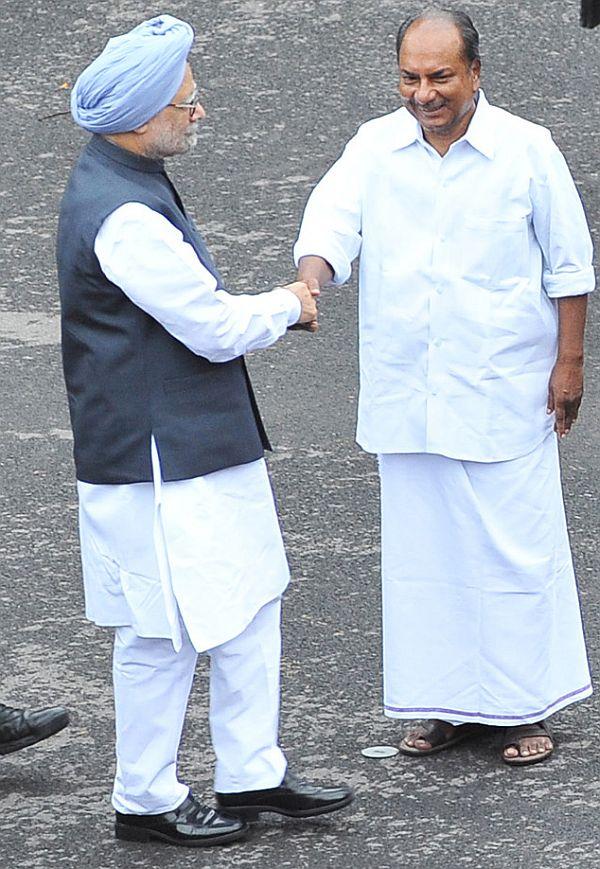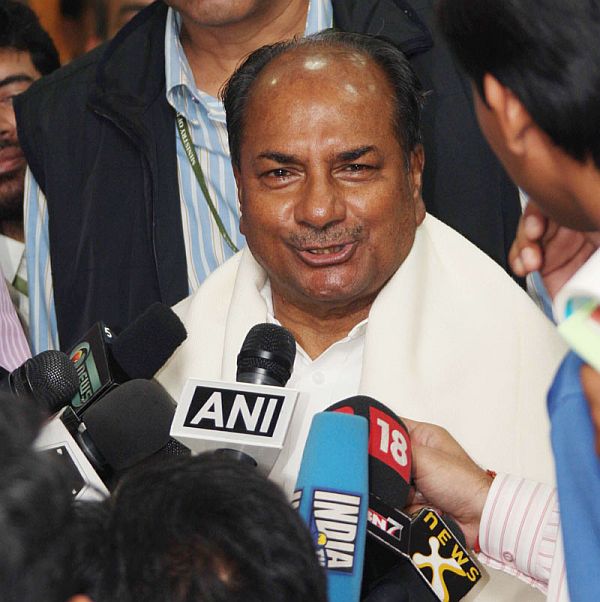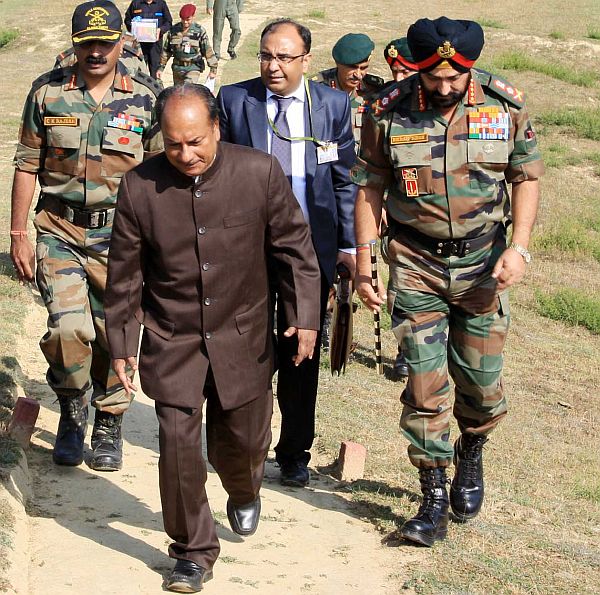Photographs: Press Information Bureau
Antony will irretrievably sully his legacy by scuttling an operationally crucial appointment, says Ajai Shukla
India's longest serving defence minister, A K Antony, will leave a spotty record when he demits office next year, a departure that seems imminent after Sunday's election results.
His regrettable penchant for avoiding difficult decisions is offset by his admirable integrity, which he has tried to enforce in the ministry of defence. But now Antony will irretrievably sully his legacy by scuttling an operationally crucial appointment that the army, navy, air force and strategic analysts almost without exception agree upon -- a permanent chairman for the chiefs of staff committee.
In October, the Naresh Chandra Task Force on national security recommended to the prime minister that this four-star post be created immediately to handle the jurisdiction where two or more service interests overlap.
The three service chiefs, who were in full agreement, sent an appointment proposal to the National Security Council. The NSC Secretariat has referred this decision to the Cabinet Committee on Security, which will rule on the matter shortly.
But Antony has put a spoke in the wheel.
On December 6, he let defence journalists know that he would oppose the proposal in the CCS. The reason, he explained, was that such an important appointment needed "political consensus", which would take time to obtain. Without Antony's concurrence, the proposal will be dead on arrival at the CCS.
...
A K Antony's intellectual dishonesty
Photographs: Press Information Bureau
Why does the COSC need a permanent chairman?
Firstly, as the military chiefs agree, the three services must coordinate closely to generate decisive power on the modern day battlefield. An army unit, fighting on an isolated mountaintop, would often rely on air force fire support when their own artillery is beyond range. A naval fleet might require air support from air force fighters flying from shore-based bases. An amphibious landing requires tight operational planning between all three services. A permanent Chairman COSC would enable such cooperation.
Secondly, tri-service autonomy causes wasteful expenditure with capabilities, organisations and equipment being duplicated and even triplicated. Rather than running redundant facilities, all three services could combine functions like strategic communications, medical services, military policing, legal services and logistics. A permanent chairman of the COSC would integrate these functions, saving money for modernisation and human resource development.
Thirdly, the government should not have to discuss military issues with three service chiefs, often getting contradictory advice. A tri-service chief would be a single point-of-contact that offers integrated military solutions after taking all service viewpoints into consideration. This is even more imperative for an emerging power whose nuclear doctrine is based on a triad of land, sea and air-based delivery systems.
For these reasons, the Kargil Review Committee recommended in 1999 the creation of a Chief of Defence Staff. The CDS was envisaged as a five-star general, admiral or air marshal, directly overseeing the four-star service chiefs of the army, navy and air force.
But the prospect of a powerful new military chief apparently set off alarm bells.
...
A K Antony's intellectual dishonesty
Photographs: Press Information Bureau
The National Democratic Alliance accepted all the GoM's recommendations except the appointment of a CDS. On that, the NDA ruled "that the recommendation in respect of the institution of the Chief of Defence Staff be considered later, after Government is able to consult various political parties."
Instead of the CDS, the Integrated Defence Staff was set up in 2001 in a token nod to jointmanship, an organisation with numerous responsibilities and few powers. Several three-star officers run the IDS, providing the army, navy and air force chiefs with handy professional cul-de-sacs into which they can shunt inconvenient generals. Yet the IDS can be strengthened and transformed into an effective tri-service headquarters under a five-star CDS, or a four-star permanent chairman COSC.
But now that seems unlikely.
The NDA's failure to act was followed by a United Progressive Alliance that uses the same threadbare excuses. On Jun 13, 2005, then defence minister Pranab Mukherjee declared that the CDS "would require a broad political consensus among parties, both in office and in opposition."
Eight years on, incredibly, Mr Antony has deployed this excuse to block even a four-star permanent chairman COSC, a post far less threatening than a five-star CDS.
The military deeply resents this humiliating lack of trust.
A top Congress leader is known to have told both UPA defence ministers that appointing a CDS might invite a coup. Mr Antony is nothing if not a loyalist; he has assumed that appointing a permanent chairman COSC would be as risky as appointing a CDS, even though the Naresh Chandra Task Force suggested the former specifically as a way of bypassing the pitfalls of the latter. Now the MoD says that a permanent chairman COSC would be "a first step towards a CDS."
Does Antony really believe that it is acceptable to stall action in 2013 with exactly the same excuses of 2001 and 2005? Financial honesty, many in the military believe, must go hand in hand with intellectual honesty.





article